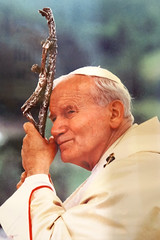Today’s the March for Life in Washington, D.C.! My oldest boy is there with a group from school, and I know many of you and/or your children are there as well. Thank you for fighting the good fight!
Because this is a Catholic name blog, I’ve written about abortion from a name perspective a few times*; today I thought I’d take a brief look at the names — real and pseudonymous — of the woman named in that 1973 Supreme Court decision**.
Jane Roe was a pseudonym for the plaintiff in the case, used to keep her identity anonymous. This article explained that John Doe and Jane Doe are used when a person’s identity is unknown, while Roe and Poe are used for those whose identity is known but who wish to remain anonymous. The woman known as Jane Roe continued to be known as Jane Roe for the rest of her life, though she revealed her real name after the case was decided: Norma McCorvey.
I spent a few minutes this morning reading articles about her with, at first, a sort of detached onomastic perspective — I was interested in finding anything that discussed her names. As has happened every time I’ve ever looked her up, though, I was moved by how much she experienced and endured from her earliest days. Even though there are questions about what was truth and what was fiction, not knowing what and especially who could be trusted seems a constant characteristic in her life. As does a definite vulnerability; I found this namey quote particularly sad and telling: “Norma McCorvey had little more to her name than a pseudonym. But it was the most famous pseudonym in American legal history: Jane Roe.” And when she became pro-life, she said before a Senate subcommittee in 1998, “I am dedicated to spending the rest of my life undoing the law that bears my name.”
What a lady, and what a life, for better and for worse. May she, and all deceased victims of abortion, rest in peace.
* Things I’ve written about abortion from a name perspective:
I would imagine Planned Parenthood fears names
Planned Parenthood vs. the Holy Name of Jesus (CatholicMom) (and my blog post sharing it, which includes further thoughts)
March for Life: Comfort and confidence in the Holy Name of Jesus
The name of Mother Teresa (includes a link to her amazing address at the 1994 National Prayer Breakfast)
Book reviews, radio appearance, naming aborted babies
** Roe v. Wade (1973) “determined that a woman’s right to decide whether to have an abortion involved the question of whether the Constitution protected a right to privacy. The justices answered this question by asserting that the 14th Amendment, which prohibits states from “depriv[ing] any person of … liberty … without due process of law,” protected a fundamental right to privacy. Further, after considerable discussion of the law’s historical lack of recognition of rights of a fetus, the justices concluded “the word ‘person,’ as used in the 14th Amendment, does not include the unborn.” The right of a woman to choose to have an abortion fell within this fundamental right to privacy, and was protected by the Constitution.”
My book, Catholic Baby Names for Girls and Boys: Over 250 Ways to Honor Our Lady (Marian Press, 2018), is available to order from ShopMercy.org and Amazon — perfect for the expectant parents, name enthusiasts, and lovers of Our Lady in your life!







